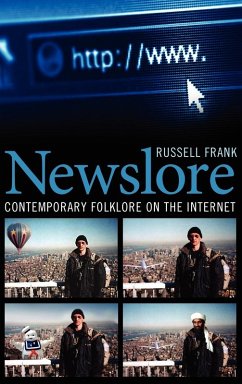An examination of the fireworks and folderol that erupt when folklore and current events collide Newslore is folklore that comments on and hinges on knowledge of current events. These expressions come in many forms: jokes, urban legends, digitally altered photographs, mock news stories, press releases or interoffice memoranda, parodies of songs, poems, political and commercial advertisements, movie previews and posters, still or animated cartoons, and short live-action films. In Newslore: Contemporary Folklore on the Internet, author Russell Frank offers a snapshot of the items of newslore disseminated via the Internet that gained the widest currency around the turn of the millennium. Among the newsmakers lampooned in e-mails and on the Web were Bill and Hillary Clinton, George W. Bush and Dick Cheney, Osama bin Laden and Saddam Hussein, and such media celebrities as Princess Diana and Michael Jackson. The book also looks at the folk response to the September 11 attacks and Hurricane Katrina, as well as the presidential elections of 2000 and 2004. Frank analyzes this material by tracing each item back to the news story it refers to in search of clues as to what, exactly, the item reveals about the public's response. His argument throughout is that newslore is an extremely useful and revelatory gauge for public reaction to current events and an invaluable screen capture of the latest zeitgeist. Russell Frank, State College, Pennsylvania, is associate professor of communications at Penn State University and a columnist for StateCollege.com, as well as a former reporter and columnist for several newspapers. His work has been published in the Journal of American Folklore, Western Folklore, New Media and Society, Journal of Mass Media Ethics, Journalism, Contemporary Legend, Rural Sociology, Los Angeles Times, San Jose Mercury News, Pittsburgh Post-Gazette, and Hartford Courant, among other newspapers.
Hinweis: Dieser Artikel kann nur an eine deutsche Lieferadresse ausgeliefert werden.
Hinweis: Dieser Artikel kann nur an eine deutsche Lieferadresse ausgeliefert werden.








